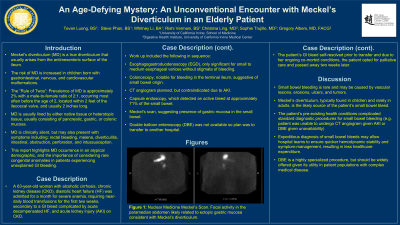Sunday Poster Session
Category: Small Intestine
P1288 - An Age-Defying Mystery: An Unconventional Encounter With Meckel's Diverticulum in an Elderly Patient
Sunday, October 22, 2023
3:30 PM - 7:00 PM PT
Location: Exhibit Hall

Has Audio

Tevan Y. Luong, BS
UC Irvine School of Medicine
Tustin, CA
Presenting Author(s)
Tevan Y.. Luong, BS1, Christina Ling, MD2, Sophie Trujillo, MD2, C Gregory Albers, MD, FACG3, Steve Huy D. Phan, BS, BA4, Whitney Li, BA5, Rishi Vermani, BS6
1UC Irvine School of Medicine, Tustin, CA; 2UCI Health, Orange, CA; 3UC Irvine Digestive Health Institute, Newport Coast, CA; 4UC Irvine Digestive Health Institute, Irvine, CA; 5UC Irvine School of Medicine, San Jose, CA; 6UC Irvine School of Medicine, Irvine, CA
Introduction: Meckel's diverticulum (MD) is a rare congenital gastrointestinal (GI) anomaly that primarily affects children under 10 years old, but can also occur in adults, with a higher risk observed in males under 50. While MD often remains clinically silent, it can manifest as abdominal pain or varying degrees of GI bleeding. We present a unique case of severe GI bleeding and anemia secondary to MD in a 63-year-old woman. This report highlights MD occurrence in an atypical demographic, and the importance of considering rare congenital anomalies in patients experiencing unexplained GI bleeding.
Case Description/Methods: A 63-year-old woman with alcoholic cirrhosis, chronic kidney disease (CKD), diastolic heart failure (HF) was admitted for a month for anemia secondary to GI bleed. Her hospital course was complicated by acute decompensated HF, and AKI on CKD. The patient experienced recurrent episodes of acute hematochezia and melena of unclear etiology leading to anemia that required near-daily blood transfusions for the first two weeks. Esophagogastroduodenoscopy (EGD) was only significant for small to medium esophageal varices, consistent with a prior EGD performed a year ago. Colonoscopy was significant for suspected small bowel bleeding observed in the terminal ileum. A CT angiogram was planned, but could not be performed due to AKI. Capsule endoscopy detected an active bleed at approximately 71% of the small bowel. A Meckel’s scan was performed and revealed the presence of gastric mucosa in the small bowel. Unfortunately, double balloon enteroscopy was not available and so transfer of care was initiated. The patient’s GI bleed self-resolved prior to transfer and due to her ongoing co-morbid conditions, the patient opted for palliative care and passed away two weeks later.
Discussion: This case is remarkable because of the rapid onset and resolution of GI symptoms secondary to MD, a congenital condition that rarely presents in late adulthood. Furthermore, standard diagnosis and treatment of MD, which includes double balloon enterography and surgical treatment including exploratory laparoscopy and resection, were complicated by the patient’s pre-existing comorbidities. This case highlights the importance of approaching clinical diagnoses by challenging conventional assumptions about MD and underscores how inaccessibility to double balloon enteroscopy led to delay in therapy for this patient.
Disclosures:
Tevan Y.. Luong, BS1, Christina Ling, MD2, Sophie Trujillo, MD2, C Gregory Albers, MD, FACG3, Steve Huy D. Phan, BS, BA4, Whitney Li, BA5, Rishi Vermani, BS6. P1288 - An Age-Defying Mystery: An Unconventional Encounter With Meckel's Diverticulum in an Elderly Patient, ACG 2023 Annual Scientific Meeting Abstracts. Vancouver, BC, Canada: American College of Gastroenterology.
1UC Irvine School of Medicine, Tustin, CA; 2UCI Health, Orange, CA; 3UC Irvine Digestive Health Institute, Newport Coast, CA; 4UC Irvine Digestive Health Institute, Irvine, CA; 5UC Irvine School of Medicine, San Jose, CA; 6UC Irvine School of Medicine, Irvine, CA
Introduction: Meckel's diverticulum (MD) is a rare congenital gastrointestinal (GI) anomaly that primarily affects children under 10 years old, but can also occur in adults, with a higher risk observed in males under 50. While MD often remains clinically silent, it can manifest as abdominal pain or varying degrees of GI bleeding. We present a unique case of severe GI bleeding and anemia secondary to MD in a 63-year-old woman. This report highlights MD occurrence in an atypical demographic, and the importance of considering rare congenital anomalies in patients experiencing unexplained GI bleeding.
Case Description/Methods: A 63-year-old woman with alcoholic cirrhosis, chronic kidney disease (CKD), diastolic heart failure (HF) was admitted for a month for anemia secondary to GI bleed. Her hospital course was complicated by acute decompensated HF, and AKI on CKD. The patient experienced recurrent episodes of acute hematochezia and melena of unclear etiology leading to anemia that required near-daily blood transfusions for the first two weeks. Esophagogastroduodenoscopy (EGD) was only significant for small to medium esophageal varices, consistent with a prior EGD performed a year ago. Colonoscopy was significant for suspected small bowel bleeding observed in the terminal ileum. A CT angiogram was planned, but could not be performed due to AKI. Capsule endoscopy detected an active bleed at approximately 71% of the small bowel. A Meckel’s scan was performed and revealed the presence of gastric mucosa in the small bowel. Unfortunately, double balloon enteroscopy was not available and so transfer of care was initiated. The patient’s GI bleed self-resolved prior to transfer and due to her ongoing co-morbid conditions, the patient opted for palliative care and passed away two weeks later.
Discussion: This case is remarkable because of the rapid onset and resolution of GI symptoms secondary to MD, a congenital condition that rarely presents in late adulthood. Furthermore, standard diagnosis and treatment of MD, which includes double balloon enterography and surgical treatment including exploratory laparoscopy and resection, were complicated by the patient’s pre-existing comorbidities. This case highlights the importance of approaching clinical diagnoses by challenging conventional assumptions about MD and underscores how inaccessibility to double balloon enteroscopy led to delay in therapy for this patient.
Disclosures:
Tevan Luong indicated no relevant financial relationships.
Christina Ling indicated no relevant financial relationships.
Sophie Trujillo indicated no relevant financial relationships.
C Gregory Albers: Abbvie – Speakers Bureau. DSI Pharmaceuticals – Speakers Bureau. Nestle Health Sciences – Speakers Bureau. Phathom Pharmaceuticals – Speakers Bureau. Salix Pharmaceuticals – Speakers Bureau.
Steve Huy Phan indicated no relevant financial relationships.
Whitney Li indicated no relevant financial relationships.
Rishi Vermani indicated no relevant financial relationships.
Tevan Y.. Luong, BS1, Christina Ling, MD2, Sophie Trujillo, MD2, C Gregory Albers, MD, FACG3, Steve Huy D. Phan, BS, BA4, Whitney Li, BA5, Rishi Vermani, BS6. P1288 - An Age-Defying Mystery: An Unconventional Encounter With Meckel's Diverticulum in an Elderly Patient, ACG 2023 Annual Scientific Meeting Abstracts. Vancouver, BC, Canada: American College of Gastroenterology.
